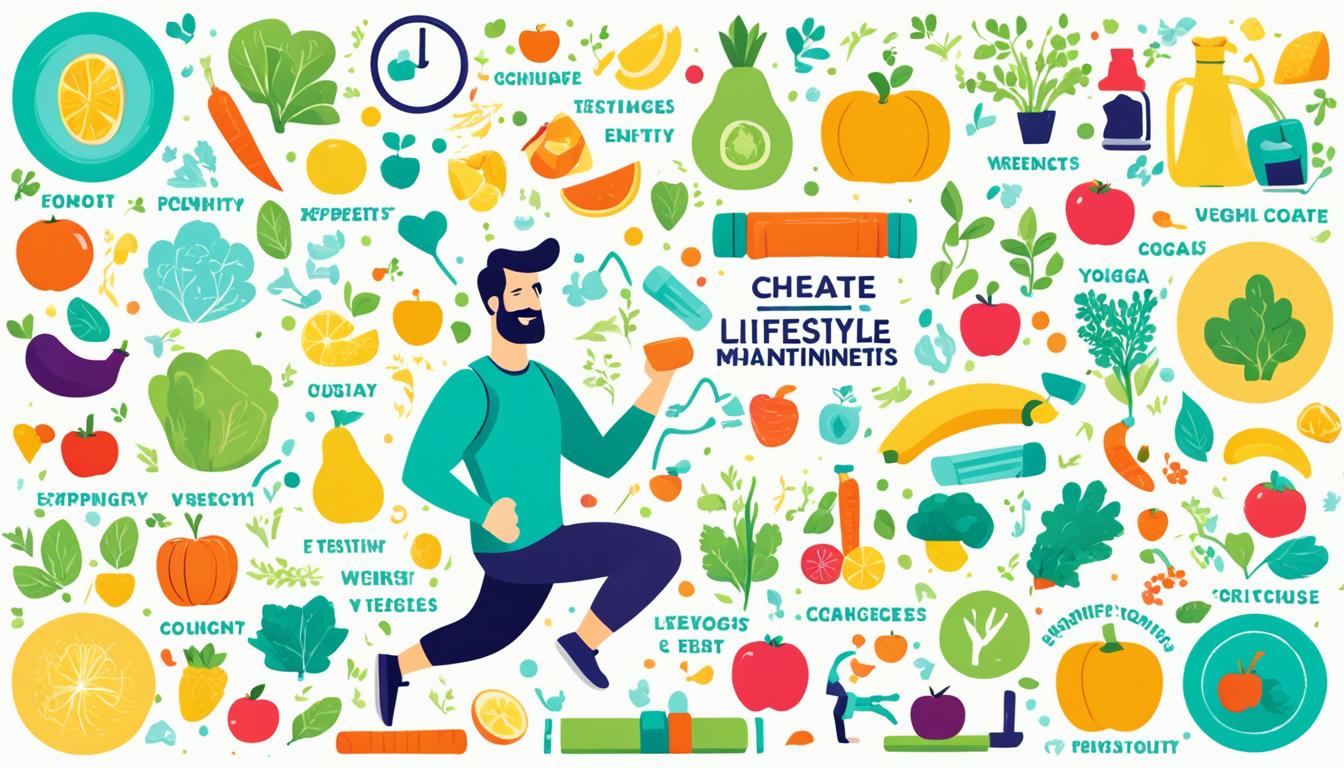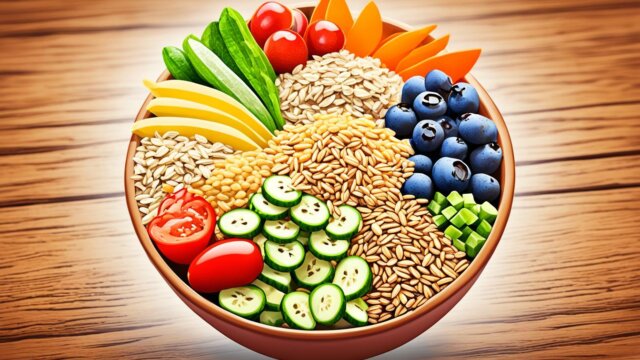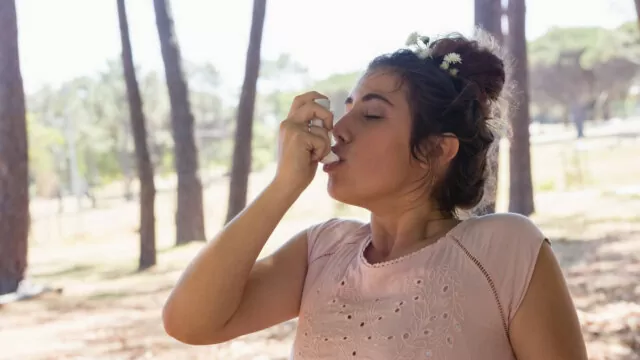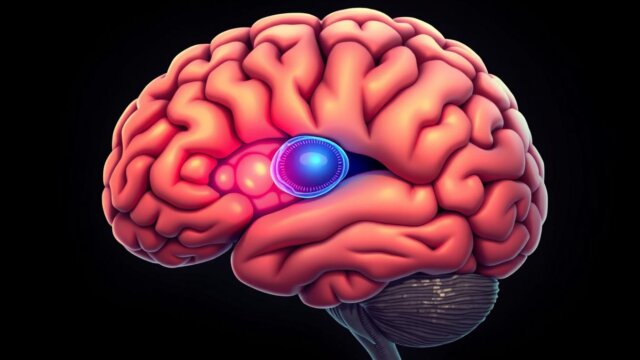FTC disclaimer: This post may contains affiliate links and we will be compensated if you click on a link and make a purchase.
May is National Mental Health Month, recognized since 1949. It’s a great time to see how changing your lifestyle can help your body and mind. While therapy and medicine are key for mental health, don’t forget the power of daily choices. Eating right, moving more, and reducing stress can really make a difference in your mental health.
Key Takeaways
- Lifestyle changes, like eating better, moving more, and managing stress, can greatly improve mental health.
- Just 30 minutes of exercise a week can lower the risk of feeling depressed.
- Start small with things like walking or picking healthier foods to make exercise a part of your day.
- Exercise can help you sleep better, feel happier, have more energy, stay alert, and think clearly.
- Positive changes in your life can make you feel strong and lead to lasting well-being.
Importance of Lifestyle Changes for Mental Health
Making positive changes in your life can greatly improve your mental health. Changing what you eat and how you exercise can help you take charge of your mental health. These changes can make your life better overall.
Impact of Diet, Exercise, and Stress Management
Eating foods rich in nutrients like leafy greens and lean proteins helps your brain work better. Regular exercise, like walking or swimming, can make you feel happier and less stressed. It can also help with depression.
Managing stress well is key too. This means keeping track of what stresses you, taking breaks, and getting support from others.
Empowering Positive Life Changes for Well-being
Thinking positively and making lasting changes can help you manage your mental health better. This might mean sleeping well, cutting down on substances, and learning about depression and anxiety. Making these choices can really improve your well-being and make you stronger.
“Lifestyle changes can have a profound impact on mental health, providing a powerful complement to traditional treatments.”
Improve Your Diet and Start Moving
Keeping healthy means eating well and moving often. To keep your brain sharp and feel good, eat foods full of nutrients. Also, start doing exercises that make you happy.
Nutrient-Rich Foods for Optimal Brain Function
Eat foods like leafy greens, beans, whole grains, lean meats, and fish. These foods are full of nutrients that help your brain work well. They have things like magnesium, folate, zinc, and healthy fats that boost your mood. It’s also key to eat less sweets and watch your drink’s sugar and calories.
Exercise Guidelines for Mental Well-being
Being active is good for your mind. Try to do at least 150 minutes of moderate exercise each week. This can be 30 minutes a day, most days. Even a 60-minute workout a week can make you feel better. For losing weight and keeping it off, aim for 300 minutes of exercise a week, or an hour a day for five days.
Finding a balance is key to a healthy life. By eating well and moving often, you help your brain work better and feel happier.
Healthy Eating Tips | Active Lifestyle Tips |
|---|---|
|
|
“Incorporating nutrient-rich foods and regular exercise into your daily routine can support optimal brain function and enhance your overall mental well-being.”
Slowly making your diet and exercise better can really help your brain and mood. Every little change towards a healthier life can greatly improve your health and happiness.
Reduce Your Vices: Alcohol, Smoking, and Substance Abuse
It’s key to tackle problem-drinking, smoking, and misuse of substances for better health. Moderate alcohol, like wine, might help prevent depression, but new studies show it doesn’t boost brain health. Quitting smoking can make you feel better and less anxious.
There’s a strong link between substance abuse and mental health. Teens with alcohol and drug issues often have mental health problems and worse health. Substance abuse often starts with drugs, legal or not, for fun. It can be pushed by friends and a family history of addiction.
Beating these bad habits needs a full plan. Learning to handle stress can cut down on drug and alcohol use. But quitting can be hard. Teen smokers often can’t stay off cigarettes, with most still smoking four years later and 70% smoking again soon after quitting.
To help teens quit smoking, we need special programs that understand their needs. We must focus on their friends too, as hanging out with smokers makes quitting harder. By focusing on your health and getting help, you can lessen your bad habits and feel better overall.
Substance Abuse Trends Among Adolescents | Percentage |
|---|---|
Adolescents with AOD use problems who reported current cigarette smoking upon treatment entry | 85% |
Adolescents who smoked at the time of treatment and continued smoking 4 years later | 80% |
Adolescents in a substance abuse treatment study who had previously attempted to quit smoking, but returned to smoking within a month | 70% |
Adolescent smokers who were daily smokers upon treatment entry | 75% |
Adolescent smokers who smoked 10 or more cigarettes daily upon treatment entry | 61% |
Working on the deep issues and finding the right support can help you cut down on bad habits. Remember, changing takes time, but with effort and the right plans, you can beat these challenges. You can live a healthier, happier life.
“Smoking adolescents have higher rates of deviant behavior, violence, and are at a greater risk of marijuana and other drug abuse or dependence.”
Starting a healthier life begins with seeing the need to tackle your bad habits. By actively managing your alcohol, smoking, and substance use, you can improve your mental health and overall well-being. You have the power to make changes that can change your life for the better.
Lifestyle Changes: Maintain Quality Sleep
Prioritize Rest and Quality Sleep
Getting enough rest is key for feeling good. Quality sleep refreshes the body and helps control stress and mood. To get better sleep, try sleep hygiene techniques. This means cutting down on caffeine, setting regular sleep times, and avoiding light before bed.
Sleep Hygiene Techniques and Regulating Sleep-Wake Cycle
Having a regular sleep schedule helps you sleep better and stay healthy. Stick to the same bedtime and wake-up time every day. Also, relax before bed and avoid screens. Putting rest first and using good sleep habits can make you feel better physically and mentally.
Also, make time for leisure activities and hobbies to reduce stress and lift your mood. Enjoy things you like, like reading, making crafts, or being outdoors. These activities are good for your mind.
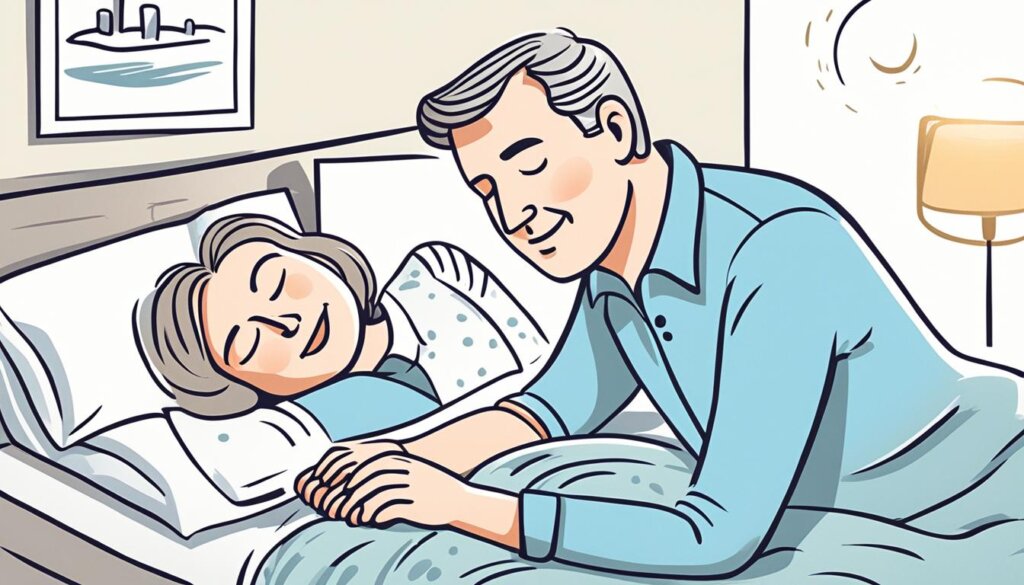
“Adequate sleep is essential for maintaining physical and mental health. By prioritizing rest and implementing effective sleep hygiene practices, you can enhance your overall well-being.” –
Get a Dose of Nature and Sunshine
Don’t overlook the power of nature and sunshine for your health. The sun helps keep your mood stable by increasing serotonin levels. It also gives you vitamin D, which is key for your mental health.
Being outside can fight off toxins and noise pollution from our daily lives. Studies show it boosts self-esteem and mood. In some parts of Asia, “forest bathing” is seen as a way to improve mental health.
Benefits of Sun Exposure and Spending Time Outdoors
- Spending at least 120 minutes in nature per week can significantly boost health and well-being
- People with more greenery around them were 34 percent less likely to die from breathing diseases
- The sun’s intensity is 200 times stronger than office lights, helping your body clock and improving sleep
- Being outside is 18.7 times safer from viruses than being indoors, which is good for your immune system and keeps infections away
- Kids who play outside are 22 percent less likely to get nearsightedness
- Outdoor activities can make you feel less scared and worried, and more happy and peaceful, which is good for your feelings
Try to spend more time in nature and enjoy the sun to get many health benefits. The outdoors can be your friend in living a healthier and happier life.
“The clearest way into the Universe is through a forest wilderness.” – John Muir
The Positive Impact of Pets and Animal Therapy
Pets can be more than just loyal friends. They can greatly improve our mental health. Studies show that having a pet can lower stress and anxiety. It can also make social skills and thinking better.
Being around animals can make us feel less stressed. It can also lower our blood pressure. Therapy dogs visit hospitals and nursing homes to ease stress. Kids with ADHD or autism can also benefit from these animals.
Pets are good for our health too. They help prevent depression and keep our hearts healthy. Pets can also protect kids from allergies and asthma.
But, we must be careful with pets, especially with young kids. Teaching kids about dog safety and respecting pets is key. Researchers are still learning more about how pets affect our health and safety.
Overall, pets and animal therapy can make us feel better mentally and physically. Whether it’s having a pet at home or using therapy animals, the benefits are clear.
Reaching Out for Professional Support
Lifestyle changes can greatly help your mental health, but they shouldn’t replace professional help. They work best with medication or therapy.
Changing your life can be hard, like stopping junk food or alcohol if you used them to cope. In these cases, getting professional help is key to making lasting changes.
Lifestyle Changes as Complementary to Treatment
Experts in mental health can guide you in adding lifestyle changes to your treatment. They help pick the best changes for you and create a plan that includes meds, therapy, and lifestyle changes.
- A study in March 2023 found that training for support group leaders helped both leaders and group members.
- A review in 2016 showed what skills and knowledge leaders need for support groups.
- A study in Norway in 2018 looked at peer support in cancer care and showed how valuable support groups are.
Working with experts makes sure your lifestyle changes fit with your treatment plan. This approach can lead to better and lasting mental health.
“Lifestyle changes are not a replacement for professional mental health treatment, but rather a complementary approach that can enhance the effectiveness of your overall treatment plan.” – Mental Health Expert
Remember, asking for help is a sign of strength, not weakness. With the right support, you can make lifestyle changes that help your mental health for the long term.
Exercise for Mental Health: Benefits and Tips
Regular exercise can greatly improve your mental health. It makes you feel happier and helps with anxiety and depression. Activities like jogging, swimming, and dancing can make you feel less anxious and depressed. Also, doing muscle-strengthening activities like yoga twice a week is good for you.
Exercise is great for your mental health. Just one to two hours of exercise per week can lower the risk of depression. Plus, doing low-intensity aerobic exercise for 30-35 minutes daily can make you feel happier.
Effects of Exercise on Mood, Anxiety, and Depression
Exercise is very helpful for anxiety and depression. It can slow down the decline in functioning for people with dementia. Regular physical activity also boosts self-esteem.
But, only 65.5% of men and 54% of women in the UK met exercise goals in 2015. Adults should aim for 75 to 150 minutes of exercise weekly. Regular exercise is key for your mental health.

“Regular physical activity is one of the most effective ways to improve your mental health. It can reduce the risk of depression, improve sleep, and increase self-esteem.”
It’s important to pick an exercise you like and can do often. Whether it’s walking, yoga, or lifting weights, the main thing is to get moving and enjoy the mental health benefits.
Strengthen Social Connections and Relationships
Building strong social ties can greatly improve your health and happiness. Studies show that good relationships with family, friends, and community boost your emotional and physical health. In fact, not having these connections can lead to a 60% higher risk of dying early.
Creating and keeping relationships takes work, but it’s worth it. Being around positive people helps you stay healthy and manage your blood sugar. Even small social activities with like-minded people can make you feel more connected.
Deep connections with a few close friends offer the best support and can be made with effort. But, it’s key to focus on the quality of your friendships for better well-being.
While social media can help connect you with others, be careful with your personal info. Try mindfulness and yoga to ease anxiety and make new friends.
Strengthening your social ties is key to a healthy life. By valuing meaningful relationships and community, you gain many benefits for your health.
Health Benefits of Strong Social Connections | Risks of Lack of Social Connections |
|---|---|
|
|
“Lifestyle medicine focuses on six pillars, including positive social connections, as a vital aspect of health care.”
Small Lifestyle Changes for Big Impact
Living a healthy life doesn’t have to be hard. Making small changes every day can make a big difference in how you feel. Focus on habits you can keep up with.
Gradual and Sustainable Lifestyle Modifications
Begin by changing what you eat. Use unsweetened applesauce instead of oil or butter in recipes to cut fat and calories. Choosing skimmed milk over semi-skimmed can also save calories. Pick wholemeal or multiseed bread over white for more nutrition.
Small amounts of exercise can add up. Three 10-minute activity sessions are as good as one 30-minute workout. Just one hour of fast walking after eating can lower blood fats.
Adding mindfulness to your day can boost your mood. Spending 10 minutes alone each day can help reduce stress. Deep breathing exercises can calm you down and make you feel more relaxed.
These small changes can lead to a healthier life over time. Every step you take adds up. These changes can greatly improve your health and happiness.

“The journey of a thousand miles begins with a single step.” – Lao Tzu
Mind-Body Connection: Holistic Approach to Well-being
Understanding the deep link between our minds and bodies is key to feeling whole. Stress can hurt our health, causing high blood pressure and heart disease, and make us feel anxious and sad. At Nu Mind Body Health, they help with mental, physical, and emotional health, showing a full way to be well. They use therapies like cognitive behavioral therapy to help with mental health, focusing on the root of problems.
Physiotherapy helps make our bodies strong, flexible, and able to move well with custom plans. Wellness coaching helps our spirit and guides us to make choices that help our health goals, making us feel better overall. Holistic health boosts wellness, stops diseases, gives power to people, and focuses on preventing problems, showing a move towards a more whole way of living.
In the past 30 years, studies have shown the mind-body link is key to our health and happiness. Our thoughts, feelings, and emotions affect our physical health, like our heart rate and sleep.
Old medicine used drugs, but now, we use therapies like talking therapy and exercise, and wellness ways like eating right and doing yoga. This new approach helps people take charge of their health and happiness.
Personal wellness plans look at our mental, physical, and behavior health, seeing how they connect and what affects them. We set goals for our mental, physical, and behavior health, and work on our relationships and money matters.
We learn more about being well through workshops and online classes, learning about stress, food, and money. We make health plans that cover our mental and physical health, and do things that help our relationships and where we live. We get counseling to help us during big changes in life, personal growth, and when things in our life change.
Overcoming Barriers to Lifestyle Changes
Starting a healthier lifestyle can be tough, but it’s doable. Many people face barriers to lifestyle changes, like not feeling motivated, fearing failure, or not having enough support. But, by knowing these hurdles and using strategies for successful habit formation, you can make a change. This leads to a more vibrant and successful routine.
Strategies for Successful Habit Formation
Changing your life doesn’t happen fast. It’s vital to take it slow and steady. Begin with achievable goals and break them into smaller steps. This makes it easier to keep going and avoid feeling overwhelmed.
Not feeling motivated is a big hurdle, but you can beat it. Think about how a healthier life will make you feel better, not just the hard work. Celebrate your wins to keep yourself motivated.
Having a supportive network is key. Get help from friends, family, or online groups to keep you accountable and cheer you on. Working with licensed professionals, like physios or exercise experts, can also help. They can guide you, especially if you have health issues or are getting over an illness.
Don’t let procrastination stop you. Start now, and remember, consistency is key for new habits. Use health monitoring apps to keep track of your progress and stay on track.
By using these tips and overcoming the barriers to lifestyle changes, you can start a journey to a healthier, happier you.

Conclusion: Embracing a Healthier Lifestyle
Starting a healthier lifestyle means making small, steady changes. These changes can greatly improve your holistic well-being. It’s not about big changes right away. It’s about adding healthier habits to your everyday life. A vibrant, long life comes from making choices that care for your body, mind, and heart.
Want to improve your mental health or just feel better overall? A healthier lifestyle can help. Slowly change what you eat, how much you move, how you sleep, and how you handle stress. This can make you feel happier, more energetic, and stronger. A healthier lifestyle also helps you and your loved ones in the long run.
On your journey to holistic well-being, remember it’s not always straight ahead. You’ll face ups and downs. But sticking to your sustainable changes helps you get past hurdles and see how much you’ve grown. Keep going, celebrate your wins, and let your health and happiness lead the way.
FAQ
What are the first-line treatments for mental health disorders like depression and anxiety?
For mental health issues like depression and anxiety, first steps include therapy and medicine. But, we often overlook how our lifestyle affects our mental health.
Can those without a mental health condition still benefit from lifestyle changes?
Yes, even if you’re not dealing with mental health issues, you might want to boost your mood and stress levels. Making positive changes can be empowering. Even with time and money limits, we can make small changes that matter.
What types of foods are important for optimal brain function?
Foods like leafy greens, beans, whole grains, lean meats, and seafood are key for a healthy brain. They give you the nutrients your brain needs to work well.
What are the general exercise guidelines for mental well-being?
Aim for at least 30 minutes of moderate exercise each day, for a total of 150 minutes a week. Even short exercises can make you feel better right away.
How does alcohol and substance use impact mental health?
Cutting down on alcohol or drugs is a key health tip. People who misuse substances often have mental health issues and worse health outcomes. Some studies suggest a bit of wine might help prevent depression, but recent findings show it doesn’t boost brain function. Quitting smoking can make you feel happier and less anxious.
What are some sleep hygiene techniques that can help regulate the sleep-wake cycle?
Good sleep habits aim to improve sleep quality and fight insomnia. This includes watching your caffeine intake, setting a regular sleep schedule, and waking up at the same time every day.
How can spending time in nature and exposure to sunshine benefit mental health?
Being in the sun boosts serotonin levels and vitamin D, which helps your mental health. Nature acts as a shield against harmful toxins and noise pollution. Being in nature can lift your mood and boost self-esteem.
What are the benefits of having a pet or engaging in animal-assisted therapy?
Pets and animal-assisted therapy can greatly improve your mood and well-being. Studies show they can make you feel better overall.
How can lifestyle changes complement mental health treatment?
Making positive lifestyle changes isn’t a replacement for treatment. They should be done alongside your treatment plan. While they can be beneficial, some changes like avoiding junk food or alcohol might be hard. They might need professional help and care.
What are the specific benefits of exercise for mental health?
Exercise is great for your mental health. It lowers anxiety, stress, and depression, and helps your brain work better. Include muscle-strengthening activities like yoga in your routine. Aerobic exercises like walking or swimming can also help reduce anxiety and depression. Exercise can cut the risk of depression by about half.
How do social connections impact physical and mental health?
Being connected with others can protect your health and even add years to your life. Our social ties have a big impact on our health, both emotionally and physically. These connections can change our biology and improve our well-being.
What is the key to making successful lifestyle changes?
Making healthy lifestyle changes can be tough, especially now. Start with small steps. Adding short exercises or healthier choices can make a big difference in making exercise a regular part of your life.
